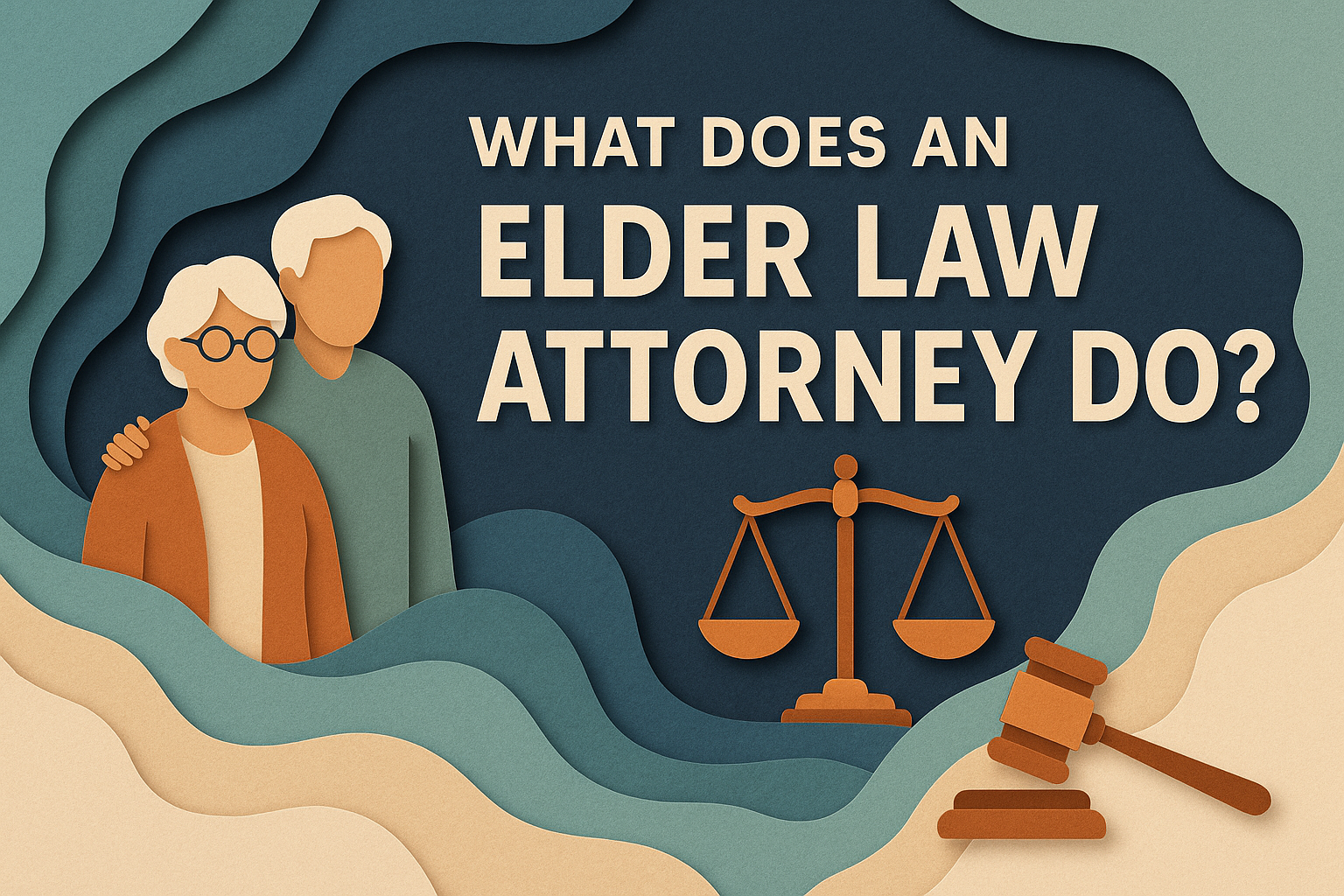
What Does an Elder Law Attorney Do?
Aging brings many changes, both expected and unexpected. Over time, legal questions that once felt distant become urgent: Who will make medical decisions if I cannot? How can I protect my assets from being consumed by long-term care costs? What will happen to my estate when I am gone? Families are often surprised by the complexity of these issues, and that is where an elder law attorney steps in.
Elder law is a specialized area of practice focused on the unique needs of older adults and their families. Unlike some legal specialties that handle only one type of case, elder law covers a broad spectrum — from estate planning to guardianship, from Medicaid eligibility to elder abuse protection. The role of an elder law attorney is both legal and practical: addressing legal questions, coordinating with financial and medical professionals, and helping clients plan for a future that safeguards both their assets and their dignity.
In this guide, we explore what elder law attorneys do, the situations where they provide the most value, and how they help families navigate some of life’s most sensitive legal challenges.
Understanding Elder Law as a Legal Specialty
Elder law is not defined by a single statute. Instead, it is an umbrella term for legal practice at the intersection of aging, disability, health care, and estate planning. Elder law attorneys must be familiar with:
-
Estate and trust planning
-
Long-term care and nursing home issues
-
Medicaid and Medicare eligibility
-
Guardianship and conservatorship
-
Powers of attorney and advance directives
-
Elder abuse, neglect, and exploitation
-
Retirement and pension benefits
-
Special needs planning for disabled adults
-
Probate and estate administration
This wide range of knowledge allows attorneys to create holistic plans that meet both immediate needs and future contingencies.
Estate Planning with an Elder Focus
Estate planning is one of the most common services offered by elder law attorneys. Beyond planning how assets pass after death, elder law estate planning addresses aging-related concerns such as incapacity, long-term care costs, and protecting assets for heirs.
Typical tools include:
-
Wills
-
Revocable and irrevocable trusts
-
Beneficiary designations
-
Transfer-on-death deeds
-
Powers of attorney
-
Health care directives and living wills
Each plan is tailored to family dynamics, financial realities, and long-term health concerns.
Long-Term Care Planning
The cost of long-term care can overwhelm even well-prepared families. Elder law attorneys guide clients through:
-
Evaluating care options (nursing homes, assisted living, in-home care)
-
Exploring long-term care insurance
-
Structuring assets to qualify for Medicaid without impoverishing a spouse
-
Setting up trusts to protect key property
Because Medicaid rules are complex and vary by state, professional guidance helps avoid costly mistakes.
Medicaid and Medicare Advice
Elder law attorneys help clients understand what Medicare and Medicaid cover, how to qualify, and how to avoid pitfalls like the Medicaid look-back penalty. They also assist with appeals if benefits are denied. This expertise often determines whether a client can afford necessary medical and personal care.
Guardianship and Conservatorship
When incapacity strikes, courts may appoint guardians (for personal care) or conservators (for finances). Elder law attorneys assist with:
-
Filing petitions
-
Representing the guardian or ward
-
Advising on duties
-
Handling family disputes
They also help avoid guardianship altogether by drafting strong powers of attorney in advance.
Powers of Attorney and Advance Directives
Central to elder law, these documents ensure that trusted individuals can act on behalf of the elder if needed. Elder law attorneys make sure they meet legal standards and reflect the elder’s values.
Elder Abuse Protection
Sadly, elder abuse is a widespread problem that can involve physical harm, neglect, or financial exploitation. Elder law attorneys help protect vulnerable seniors by obtaining restraining orders or protective orders, reporting abuse to the appropriate agencies, recovering stolen assets, and holding abusers accountable through civil lawsuits. They also educate clients and families about warning signs of abuse and steps they can take to prevent it. For a deeper look at how cognitive decline can make seniors vulnerable, see Hackard Law’s recent blog on Dementia & Cognitive Decline: Protecting Seniors from Financial Exploitation.
Special Needs Planning
For families with disabled relatives, elder law attorneys establish special needs trusts to provide ongoing care without jeopardizing government benefits.
Probate and Estate Administration
When a loved one passes, elder law attorneys guide families through probate: filing documents, managing debts, and distributing property while minimizing disputes.
Real-World Example: Preventing Conflict
An elder law attorney helped a father with two adult children divide responsibilities clearly: one child as financial power of attorney and the other as health care agent. The clarity prevented disagreements as his health declined. For more insight into family conflicts in elder planning, see Hackard Law’s 2025 blog Inheritance Battles and Broken Bonds: Why Estates Ignite Family Feuds.
The Value of Specialized Legal Guidance
Elder law attorneys combine legal expertise with compassion. They address not only legal documents and court filings but also family relationships, medical transitions, and financial planning. Their role is both advisor and stabilizer, ensuring peace of mind during challenging times.
Final Words
An elder law attorney helps clients protect assets, secure benefits, guard against abuse, and ensure their wishes are honored. They bring foresight and clarity to some of life’s most complex legal issues. For families, working with an elder law attorney means having a trusted guide who can balance legal rules with human realities.
If you are planning for long-term care, facing guardianship questions, or worried about protecting a vulnerable loved one, contact Hackard Law today. Our team is committed to safeguarding both dignity and security in life’s later stages.

 (916) 775-8542
(916) 775-8542